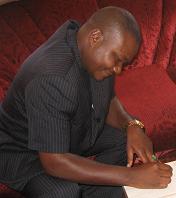Chris Hassan became the Plateau State Co-coordinator of the National Poverty Alleviation Programme just six months ago. Accepting this position automatically placed on his shoulders the responsibility of the implementation of the new blueprint of National Poverty Eradication Council (NAPEC) for the eradication of poverty across the nation. The new policy became imperative in view of the shortcomings of the previous programme where trainees were more interested in the monthly stipends but not the skill, which is necessary if poverty must end.
Challenges
Chris says the biggest challenge on his assumption of office, as the Coordinator of the programme, was the absence of communication between his office and the people the office is meant to serve. According to Chris, a lot of people even in the immediate neigbourhood of his office in Jos South were oblivious of the organization. Those who knew were skeptical of the financial assurances of the organization to help them bid farewell to poverty. His office was then compelled to commence investing huge financial resources on jingles. It also had to create offices in all the seventeen Local Government Areas. There was also the recruitment of the manpower made up of people of grade levels nine to ten to run these offices with the sole intention of reaching all the districts across the states.
Programmes
The Coordinator said the policy guidelines of NAPEP are designed by NAPEC, which is chaired by the President. It has, as its members, seventeen serving federal Ministers, the National Coordinator of NAPEP and the national economic adviser. Two of the programmes of NAPEP in Plateau State are the ones drawn by NAPEC at the national headquarters in Abuja. They are the primary programmes that all states branches must adhere to. These include the Village Economic Development Solutions, VEDS and the Micro Credit Scheme. Having studied the peculiarities of Plateau State, his office decided to bring in additional programmes to compliment those of the federal office. Thus at the state level, the Mandatory Attachment Programme for unemployed graduates, the Skill Acquisition and Widowhood Schemes were added.
Loan Disbursements so Far
Under VEDS individuals are not qualified to apply for loans. A group made up of a minimum of ten people and a maximum of thirty must register as a cooperative group according to the terms stated by the Ministry of Commerce and Industry. These cooperative groups then apply on behalf of the members. So far 149 cooperative groups have benefited from the loans in the state. The total financial loan disbursement to these groups now stands at N146 million. Under the Widowhood and Micro Credit Schemes, N2 million have been issued out to each of the seventeen Local Government Areas of the state amounting to a total of N 34 million. In addition to these there is also another N6 million from an NGO known as the Grassroots Women and Men that has also been disbursed evenly to the seventeen Local Government Areas. The grand total of loan disbursements now stands at about N186 million.
Repayments of the Loans
In view of the fact that Nigerians have often seen public funds within their reach as a piece of that Nigerian national cake, it could be the reason why there may be difficulties in the repayments of the loans. Chris says there is usually the pre-assessment of potential beneficiaries, which is undertaken by the monitoring department of his organization in addition to that undertaken by the micro-financial institutions nearest to them and through which the loans are issued. They must show an existing venture they intend to use the loan to improve. Besides the pre-assessment, there is also the post assessment usually undertaken using standard means of appraisal such as templates to ensure that beneficiaries remain committed to the ideals of the scheme.
In the event of failure of repayments by beneficiaries, his organization will resort to a memorandum of understanding that involved a legal document singed by the guarantors of beneficiaries.
Funding of NAPEP
Funding of the organization comes primarily from the Federal Government through the Millennium Development Goals office. In addition to that is counterpart funding from the Plateau State Government. There is also the NGO, Grassroots Women and Men. The state branches across the nation never receive allocations in the year 2008 however. The money that has been used in 2008 is a rolled over of the financial resources that was meant for 2007 in addition to the N50 million from the state government. In 2008, the Grassroots Women and Men also gave N6 million.
Plan for the Next Six Months
The next six months is a period during which the organization will continue to give out loans says Chris who pointed a stack of application files at a corner of his office. This however depends on the availability of money to give out to beneficiaries. The Coordinator thanked the Governor for his commitment to the poverty alleviation programme through prompt action whenever it matters. The NAPEP boss says the indication from the 2009 budget is that they may get more than they got in 2008











